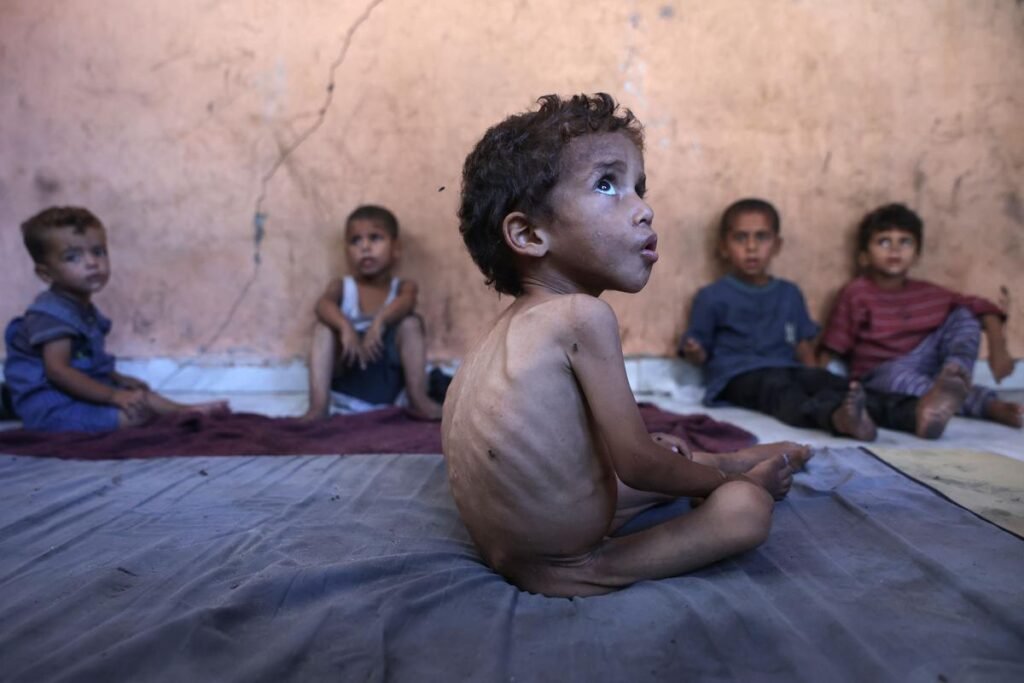The world must stop Israel from annihilating Gaza through starvation

- Introduction: A Crisis We Created
- The Everyday Reality in Gaza
- Hunger as a Weapon
- Children Caught in the Middle
- What Families Are Saying
- Why Food Isn’t Getting In
- Where Is the Global Community?
- Famine Doesn’t Just Happen
- What the World Must Do Now
- Final Thoughts: Our Shared Responsibility
Introduction: A Crisis We Created
Famine is not a natural disaster. It doesn’t fall from the sky like rain. It doesn’t spread like wildfire. It is built—deliberately, cruelly, and with cold calculation.
Today in Gaza, people—children, mothers, grandparents—are starving. Not because food doesn’t exist. But because it’s being blocked, delayed, denied. Because the systems meant to protect life are failing or refusing to act.
The world is watching Gaza collapse, not from a lack of resources, but from a lack of will.
And the question we must ask ourselves is simple, heartbreaking, and urgent:
Are we okay with letting an entire population starve into silence?
The Everyday Reality in Gaza
Imagine waking up every day and wondering not what you’ll eat—but if you’ll eat.
In Gaza, families queue for hours just to receive a bag of flour or a bottle of clean water. Children survive on barely one meal a day. Parents skip meals so their babies can eat. Hospitals have run out of food for patients. Pregnant women are giving birth malnourished. Breastfeeding mothers are too weak to produce milk.
This isn’t a future nightmare. This is today.
Neighborhoods once filled with laughter and life are now filled with hollow eyes and empty plates. Hunger has become the new normal.
And the worst part? It’s preventable.
Hunger as a Weapon
Let’s call it what it is: starvation as a tool of war.
Blockades. Border restrictions. Bombed-out bakeries. Aid trucks stuck for days. Lifesaving shipments turned away. Humanitarian corridors promised, then shut down. This isn’t a failure of logistics—it’s a strategy.
Controlling food is controlling people.
In Gaza, the choice to deny food is being made daily. And the consequences are being paid by innocent civilians, not governments or armies. By the ones who have the least power and the most to lose.
There’s a word for this: man-made famine.
And history will remember it as one of the greatest crimes of our time—unless we stop it now.
Children Caught in the Middle
No one suffers more in a famine than children.
In Gaza, toddlers are being diagnosed with acute malnutrition. Their bodies are bloated, their bones visible, their energy gone. They cry not because they’re fussy—but because they are hungry.
Schools, if they’re still standing, no longer serve lunches. Kindergartens now double as shelters. Many children have lost not only access to food but also their homes, their friends, their childhoods.
There are no playgrounds in a famine zone. Only long lines for bread that may never arrive.
And still, the world delays.
What Families Are Saying
When you speak to families in Gaza, they don’t ask for luxuries. They don’t even ask for comfort. They ask for bread. For water. For milk.
A father says, “I told my children to sleep, so they won’t feel the hunger.” A mother admits, “I water down soup until it’s just warm water.”
They feel forgotten, abandoned, punished for things they never did.
Their stories are simple and devastating. Not political. Just human.
And they all end with the same question:
“When will someone help us?”
Why Food Isn’t Getting In
Aid agencies say they are ready. The food is there. The trucks are waiting. But borders remain closed. Checkpoints are slow. Bureaucracy is killing faster than bullets.
Convoys are turned back. Supplies are confiscated. Sometimes, they never even make it in.
Some humanitarian workers say they’ve never seen anything like this—not even in war zones or disaster sites.
The machinery of aid is in place. But it’s being held hostage by those in power. And every hour lost is another life lost.
Where Is the Global Community?
The world has spoken—on paper. Resolutions have been passed. Meetings held. Speeches made. But in Gaza, those words don’t translate to meals.
This is not a matter of politics anymore. This is about survival.
The silence—or slow response—of powerful nations is not neutrality. It is complicity.
Gaza doesn’t need more statements. It needs action. Food, water, medicine, safety.
And it needs it now.
Famine Doesn’t Just Happen
There’s a myth that famine is inevitable in war. It’s not.
Famine happens when decisions are made to restrict aid. When food is used as leverage. When humanitarian principles are sacrificed for political wins.
It is planned, and it is preventable.
In Gaza, the world has enough warning signs. But the response has been too slow, too cautious, too late.
We must act before starvation becomes extermination.
What the World Must Do Now
The path forward is clear, even if it’s hard.
Borders must be opened for humanitarian aid without delay. International pressure must be applied not through gentle diplomacy, but through real consequences. Sanctions, legal accountability, global outrage—whatever it takes to save lives.
Humanitarian workers must be protected, not targeted. Food must not be politicized. And most of all, we must put people first—above pride, power, or politics.
Every delay costs lives. Every day lost is another child’s body too weak to stand.
Final Thoughts: Our Shared Responsibility
We will be judged for how we responded to this.
Not by future generations, but by the ones suffering right now. The mothers who cannot feed their babies. The fathers who dig graves instead of planting gardens. The children whose laughter has been replaced by silent hunger.
Gaza does not need pity. It needs justice. It needs food, water, safety, and peace.
We cannot allow starvation to be a tool of war. Not now. Not ever. Not in our name.
This is not just a crisis in Gaza. It is a crisis of humanity.
And humanity must answer.







Leave a comment